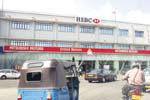United Motors group worried about high taxation United Motors Ltd has joined scores of listed companies in Sri Lanka in raising concern over the high rate of taxation.
“The tax burden on the private sector in the current year is unprecedented,” said company chairman Mahendra Amarasuriya in the latest financial report of the firm. Amarasuriya, who is taking over as Lions International President serving as the Vice President now, also focused on the country’s peace process and hopes of the business community: “The full potential of Sri Lanka’s private sector in fulfilling its role as the engine of growth can be effectively harnessed only if sustainable peace, political stability and stable fiscal policies become a reality. The year ahead (2006-07) is bound to be a challenging one for the company. Amongst the business uncertainties lie the possible adverse consequences of a further deterioration in the security situation which could restrain demand, destabilise exchange rates and increase borrowing costs,” he said. The United Motors chief said corporate taxes are seen rising to 35% from 30%; vehicle prices are expected to remain high with VAT on passenger vehicles rising to 20% from 15%; the Social Responsibility Levy (SRL) up at 1% from 0.25%; Port and Airport Development Levy (PAL) raised to 2.5% from 1.5%; stamp duty has been reintroduced and customs and excise duties continue to be exorbitant, Amarasuriya added. The report said notwithstanding a trade deficit of approximately $2.4.billion, the country’s balance of payments position improved mainly on account of the increase in private remittances, influx of foreign funds for rehabilitation work, rescheduling of debts and containment of defence expenditure owing to the ceasefire agreement which enabled the rupee to remain relatively stable throughout 2005 and up to the period under review. He said over the last five years Indian products have made a considerable impact on the vehicle market in Sri Lanka mainly due to preferential trade access to the Sri Lankan market under the bilateral trade agreement. India is currently the largest supplier of motor vehicles to Sri Lanka – the share of imports having increased from 17% in 2000 to 47% in 2005. Import statistics reveal that most of the motor cycles, three wheelers, tractors, buses, motor cars with cylinder capacity below 1000cc and motor vehicles for the transport of goods with GVW higher than five tonnes, are supplied by India. Most of the other vehicle types are still dominated by Japanese makes although increasingly price competitive options are being sourced. Registrar of Motor Vehicles statistics reveal that 178,705 vehicles were registered in 2005 which is a 20% decline from the previous year. However the registration of Japanese and non-Japanese brand new vehicles have increased during the year by 11% and 19%, respectively. The market share of Mitsubishi in the brand new Japanese vehicles segment rose to 30% last year from 18% in 2004. Mitsubishi vehicle sales improved significantly over the previous year, with sales volumes increasing by 49% and turnover by 38.1%. Of the Mitsubishi vehicles sold during the financial year, around 70% were commercial and dual purpose. The company’s recent entry into the leasing market through its subsidiary, Orient Financial Services Corporation Ltd, has added muscle to group activities. In a short period of two to three years the company has made a strong impact in the market place and contributed significantly to group profits. “Among the star performers in the group is the jointly controlled entity, TVS Lanka (Pvt) Ltd. which, within a period of three years has become a formidable player in Sri Lanka’s two wheeler market with the Indian made TVS motor cycle acquiring the second largest market share. In the financial year 2005/06 the company’s sales volumes grew by 45% whilst turnover and profits grew by 58.5% and 97.6% respectively. Its subsidiary, TVS Autoparts (Pvt) Ltd. is now a leading OE parts distributor in Sri Lanka,” the chairman’s review said. Orient Motor Company Ltd. owns a fleet of over 460 vehicles which has been hired to the corporate and government sector but the company has been making losses in recent years due to the high depreciation charge on its vehicle and the interest on bank borrowings which has financed almost the entirety of the vehicle fleet. “However, in 2005/06 the company succeeded in cutting down its losses by 55.8% and these losses are expected to be recouped when the vehicles are sold or re-hired in future years,” the report said. Property development company, UML Property Developments Ltd completed its seven-year tax holiday at the end of March 2006 and from now on would be taxed at a concessionary rate for a period of 15 years. Post tax profits at the UMLL Group grew by a strong 96.4% while turnover rose by 37.1. (RI)
|
||||
Copyright © 2006 Wijeya Newspapers
Ltd. All rights reserved. |
